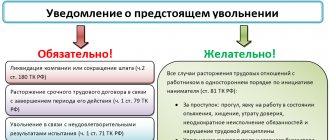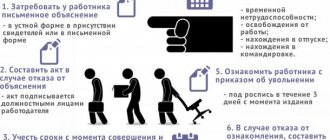Provisions of the Labor Code on leave without pay at the initiative of the employer
In 1996, the issue of free holidays at the initiative of the enterprise management was considered by the Ministry of Labor. It has issued clarifications on this issue. After this, a resolution was issued that confirmed them.
There, situations were considered when an employee can go on vacation without pay. It was indicated that one of the reasons could be family circumstances. The employee had the right to ask for leave, confirming the reason with relevant documents. In such a situation, it was allowed to take a vacation of up to 5 days.
Other options to go on unpaid leave are not prohibited, but can only be carried out with the permission of the boss.
The Labor Code of the Russian Federation allows certain categories of citizens to receive this type of leave at their own request:
- If a citizen is retired but continues to work, he is given this right. However, during the year you are allowed to receive no more than 14 days. You can take vacation days in parts or all at once.
- An employee who is the wife of a deceased military man has the right to take 14 days without pay annually.
- If an employee has a disability, he is allowed to receive 60 days annually at his own expense.
- A student who works is entitled to 15 days of such leave.
- Those who take entrance exams to a university receive 15 days to do so.
- 35 days are given to veterans of the Great Patriotic War.
In addition to those who receive this right on the basis of the Labor Code of the Russian Federation, there are other categories whose vacation is determined by other regulations:
- Heroes of Socialist Labor receive 21 days of leave without pay.
- those who were residents of besieged Leningrad have the right to go on unpaid leave for two months;
- Heroes of the Soviet Union are given the right to 21 days;
- Heroes of Russia can receive up to 21 days of unpaid time off each year.
Additional leave for combat veterans
Combat veterans have a benefit according to which the employer must provide and pay for additional leave of 15 days (Article 11 of Federal Law No. 76 of May 27, 1998). It is due to those veterans who serve under a contract or conscription. Upon dismissal from service, the right disappears.
Veterans can receive leave without pay, the duration of which is up to 35 days during the year (Article 16 of Federal Law No. 5 of January 12, 1995). The document - the basis for obtaining - a combat veteran's certificate.
Simple
This situation arises if work was suspended by decision of the employer. The reasons can be not only economic, but also technological, organizational or technical.
Although this situation is similar to an unpaid vacation, there are two important differences:
- if there is downtime due to the fault of management, then the employee receives two-thirds of his average earnings for his entire time;
- During time off, the employee is not at his workplace; during downtime, he must be at work.
Usually the question of where he should be is decided by the manager, taking into account current regulations. If the employee is allowed to leave the workplace, he may have free time.
Payment for downtime depends on who was at fault. There are three possible cases:
Advantages and disadvantages of being on leave without paying wages
How can a vacation at your own expense end?
The benefits that an employee receives by taking leave without saving his earnings include:
- Availability of free time necessary for the employee to achieve the goals that were set out by him in the application.
- Retention of the employee’s immediate workplace - as provided for in the provisions enshrined in Art. 81 of the Labor Code of the Russian Federation, during the period when an employee is on vacation without payment of earnings, his dismissal on the initiative of the employer is not allowed, except in cases such as the liquidation of the company or the termination of its activities.
- There is no reduction in the employee’s average earnings since, in accordance with the law, the time spent on the above-mentioned vacation is subject to exclusion from the calculation period when calculating average earnings.
- Payment for leave provided due to pregnancy or childbirth.
- The employee has the opportunity to use tax deductions since their registration does not depend on whether the employee received or did not receive monthly income.
The disadvantages of an employee being on leave without payment of earnings may include the following circumstances:
- Lack of payment for the period of incapacity for work - as explained in the FSS letter No. 02-13/07-7422 dated 08/09/2007, if during the period when the employee was on leave without payment of wages, he developed an illness, and recovery occurred after the end of the of this vacation, then the issuance and payment of sick leave is made starting from the first day (calendar) that follows the day that is the end of the vacation.
- Exceeding the 14th period established by law entails (in accordance with the provisions enshrined in Article 121 of the Labor Code of the Russian Federation) deduction from the main payable vacation of each day that exceeds the mentioned period.
- Non-inclusion in the insurance period (calculated when applying for a pension) of the time the subject is on vacation without payment of the salary due to him - as provided for by the provisions set out in paragraph 1 of Article 10 of the Federal Law “On Labor Pensions in the Russian Federation”, those intervals are subject to inclusion in the insurance period labor activity for which appropriate deductions were made to the Pension Fund.
Suspension from work
This refers to a situation where a manager has suspended a subordinate from work for certain reasons.
This usually happens in the following situations:
- An employee who came to work while intoxicated (it could be alcohol, drugs or any other) is suspended.
- To perform your immediate duties, you must undergo appropriate training in labor safety. If this is not done, dismissal from work is possible.
- Some professions require a mandatory medical examination. Sometimes a psychiatric evaluation is necessary. If an employee evades these procedures, the boss must remove him from his immediate duties.
- Sometimes someone starting a job must meet certain medical requirements. If he does not comply with them, he cannot perform his job duties.
- Failure to have the appropriate qualifications to perform the job, or a license if required, will result in disqualification.
- Removal occurs at the initiative of the boss if there are appropriate grounds. This is done only until the causes are eliminated.
If an employee was suspended due to his fault, then his salary will not be accrued. However, a situation is possible when he did not pass the medical examination through no fault of his own. In this case, his work is paid in the same way as during downtime. A similar situation occurs if he did not receive instructions on labor protection issues due to the fault of other people.
A medical report may cause an employee to be transferred to another location for up to four months. If he refuses to comply, he is removed. At the same time, for the specified period, his workplace remains with him.
It happens that the boss does not have the opportunity to provide the work mentioned. However, in this situation, the employee will be suspended for the specified period.
In the latter case, wages are usually not calculated, but the collective agreement may provide for payment in such situations. Another basis for receiving money may be an employment contract concluded with him.
Simple: how to pay
Downtime is a temporary suspension of work for reasons of an economic, technological, technical or organizational nature. It can be called a vacation with certain restrictions. After all, downtime refers to working time, which means that the employee cannot decide on his own that he will be at home during the downtime period.
| Reason for downtime | Payment order |
| due to the employer's fault | at least 2/3 of the employee’s average salary |
| for reasons beyond the control of the employer and employee | at least 2/3 of the tariff rate, salary (official salary), calculated in proportion to downtime |
| due to the employee's fault | not paid |
The procedure for determining the average salary is provided for in Art. 139 Labor Code of the Russian Federation.
If the downtime is caused by equipment breakdown and other reasons that do not allow the employee to perform his job function, the employee must inform his immediate supervisor or the employer’s representative about the start of the downtime.
Time is not downtime when creative workers of the media, cinematography organizations, television and video crews, theaters, theatrical and concert organizations, circuses and other persons involved in the creation or performance of works do not participate in the creation or performance for any period of time. works or do not perform.
Forced absenteeism
One of the reasons for absence from work may be, for example, illegal dismissal. If such a situation occurs, the employee must prove the fact that the dismissal was illegal. In this case, he must be fully compensated for the earnings that he did not receive for this reason. This is stated in Article 234 of the Labor Code of the Russian Federation.
It must be taken into account that this period of time must be taken into account when determining the length of service that gives the right to receive basic paid leave in accordance with Article 121 of the Labor Code of the Russian Federation.
Leave without pay for preferential category employees
The employer is obliged to provide such leave in accordance with the provisions of Part 2 of Article 128, Articles 173 and 174 of the Labor Code of the Russian Federation, Law of the Russian Federation dated January 15, 1993 N 4301-I “On the status of Heroes of the Russian Federation and Full Knights of the Order of Glory” and federal laws:
- dated January 12, 1995 N 5-FZ “On Veterans” (hereinafter referred to as the Law on Veterans);
- dated 01/09/97 N 5-FZ “On the provision of social guarantees to Heroes of Socialist Labor and full holders of the Order of Labor Glory”;
- dated May 27, 1998 N 76-FZ “On the status of military personnel”;
- dated 05/06/2011 N 100-FZ “On voluntary fire protection”;
— dated 03/02/2007 N 25-FZ “On municipal service in the Russian Federation”;
— dated July 27, 2004 N 79-FZ “On the State Civil Service of the Russian Federation”;
- dated January 10, 2003 N 19-FZ “On the elections of the President of the Russian Federation”;
— dated May 18, 2005 N 51-FZ “On elections of deputies of the State Duma of the Federal Assembly of the Russian Federation”;
- dated June 12, 2002 N 67-FZ “On the basic guarantees of electoral rights and the right to participate in a referendum of citizens of the Russian Federation.”
To provide this type of leave, the employer’s consent is not required; only a written application from the employee is required.
Unpaid leave at the request of the employer
The legislation does not provide for the option when a boss requires a subordinate to take leave without pay.
If we are talking about a request from a boss to his employee, then the latter has the right to voluntarily agree to such a development of events. In this case, leave at your own expense is issued in the usual way. The only peculiarity is that, in case of agreement, the duration of the rest is automatically agreed upon.
Can they be sent on vacation without consent?
The law answers this question unequivocally: the employer does not have such a right. However, in real life this is not so rare. In fact, there is a request from the boss to the subordinate about this. Moreover, it is very difficult to refuse in this situation.
Typically, such situations arise in cases where the company, for some reason, does not have enough money to pay salaries. If employees go on leave without pay, the salary fund for the corresponding month will be significantly less.
What to do if your employer forces you to take leave without pay?
Leave without pay at the initiative of the employer is illegal.
Most often, the need to send staff or part of it on unpaid leave arises when an enterprise is going through a crisis and there is simply no money to pay employees’ wages.
It also happens that management sends employees to “rest”, hiding behind the term “production necessity.” The reason may be repairs or other urgent work.
It’s one thing when an employer tries to reach an agreement with employees and promises to compensate unpaid days with bonuses or other incentives in the future. Then workers can compromise: the ruin of the enterprise is not in their interests either.
And it’s another matter when the manager threatens with dismissal, reduction of bonuses or demotion in case of refusal to go on unpaid leave. What to do in such a situation?
The rights of workers are protected by the labor inspectorate. If the manager forces you to go on leave without pay, you must file a complaint. It is better if this is a collective complaint signed by several employees.
In addition, an employee who has been sent on unpaid leave without his consent has the right to demand payment of two-thirds of his salary through the court.
How to send an employee on vacation at your own expense
This situation usually arises if the workload of subordinates is insufficient. Since it is impossible to send an employee on unpaid leave, we can say that there is downtime.
Thus, the employee will receive two-thirds of his salary during this time. Of course, in this case there will be some savings in the salary fund, but it will be much less than in the case of taking unpaid leave at will.
The financial difficulties of an enterprise fall under the category of business risk, which is borne by the employer, and not by his employees.
Maximum period of leave without pay
There is no direct limitation on this period.
If the law allows the employee to take the leave in question, then the following rules apply:
- If there is a good reason, which is confirmed by relevant documents, then at his request he must be granted such leave for a period of up to 5 days.
- The law provides certain categories of the population with the right to take free vacation at will within the allotted number of days.
- If the law allows an employee to take a certain number of days without pay within one year, he can receive them if his boss does not object.
- If an employee has exceeded his limit, then, in agreement with the director, he can receive the required number of days off, however, all days exceeded will be deducted from the length of service to determine vacation time.
The standard number of days of unpaid leave allowed is fourteen days. For certain categories of citizens this number has been increased. Thus, a person with a disability has the right to receive sixty days for this purpose.
You can't refuse, you can't let go
There are several cases when an employer cannot refuse an employee: the birth of a child, a wedding or the death of a close relative. This is stated in Art. 128 Labor Code of the Russian Federation. It also lists the categories of employees who are required to be granted leave without pay, regardless of the reason. These are pensioners, disabled people, family members of deceased military personnel, etc.
The right of employees to leave without pay is stipulated not only in the mentioned article. Categories of citizens whom the leader cannot refuse are also listed in Art. 173 and 174 of the Labor Code of the Russian Federation and a number of federal laws. We have collected all the main cases together; they are presented in the table below.
| Employees who are granted leave | Duration of leave without pay | Base |
| 1. Cases regulated by the Labor Code of the Russian Federation | ||
| Any employee in cases of birth of a child, registration of marriage, death of close relatives | Up to 5 calendar days for each reason | Art. 128 Labor Code of the Russian Federation |
| Parents, wives (husbands) of military personnel who died or died as a result of injury or injury received during the performance of military duties, or as a result of a disease associated with military service | Up to 14 days a year | Art. 128 Labor Code of the Russian Federation |
| Participants of the Great Patriotic War | Up to 35 days a year | Art. 128 Labor Code of the Russian Federation |
| Working disabled people | Up to 60 days a year | Art. 128 Labor Code of the Russian Federation |
| Working pensioners by age (old age) | Up to 14 days a year | Art. 128 Labor Code of the Russian Federation |
| Employees combining work with obtaining higher professional education in bachelor's, master's, etc. programs* | ||
| Employees admitted to entrance exams | 15 days | Art. 173 Labor Code of the Russian Federation |
| Workers - students of preparatory courses | 15 days for final certification | Art. 173 Labor Code of the Russian Federation |
| Workers who are already undergoing training | — 15 days per academic year for intermediate certification; — 4 months for preparing and defending the final qualifying thesis and passing the final state exams; — 1 month for passing final state exams | Art. 173 Labor Code of the Russian Federation |
| Workers combining work with secondary vocational education* | ||
| Employees admitted to entrance exams | 10 days | Art. 174 Labor Code of the Russian Federation |
| Workers who are already undergoing training | — 10 days per academic year for intermediate certification; — 2 months for state certification | Art. 174 Labor Code of the Russian Federation |
| 2. Cases regulated by federal law | ||
| Civil servants | Up to 1 year | Federal Law of July 27, 2004 No. 79-FZ |
| Municipal employees | Up to 1 year | Federal Law of March 2, 2007 No. 25-FZ |
| Military spouses | Part of the spouses' leave exceeding the duration of the annual leave at the main place | Federal Law of May 27, 1998 No. 76-FZ |
| Heroes of Socialist Labor, Heroes of Labor of the Russian Federation and full holders of the Order of Labor Glory, Heroes of the USSR, Russian Federation and full holders of the Order of Glory | Up to 3 weeks per year | Federal Law of 01/09/1997 No. 5, Law of the Russian Federation of 01/15/1993 No. 4301-1-FZ |
| Invalids of war | Up to 60 days | Federal Law of January 12, 1995 No. 5-FZ |
| Combat veterans who worked during the Second World War at air defense facilities, construction of defensive structures, naval bases and other military facilities | Up to 35 days a year | Federal Law of January 12, 1995 No. 5-FZ |
| Proxies of candidates participating in elections, as well as proxies of electoral associations | For the period of office | Federal Law of June 12, 2002 No. 67-FZ |
| Proxies of a political party, candidates nominated in electoral districts | For the period of office | Federal Law of February 22, 2014 No. 20-FZ |
* Applies only to those employees who study full-time or receive a second and subsequent education. If an employee is receiving education for the first time or studying part-time/part-time, then the leave is paid and is called study leave.
The employer must provide leave to a part-time employee if the rest period at his main place of work is longer. The part-time worker covers the missing days without pay.
Art. 319 of the Labor Code of the Russian Federation guarantees one of the parents working in the Far North and equivalent areas, who has a child under 16 years of age, an additional day off without pay upon written application.
In addition to the listed cases, leave without pay may be provided for by a collective agreement if the appropriate condition is specified in it. For example, an employer can give annual additional leave of up to 14 calendar days to women with two or more children under 14 years of age, parents of disabled children under 18 years of age at a time convenient for them, etc.
It is worth noting separately that the employer has the right to refuse the employees mentioned above if they have already exhausted their limit on the duration of mandatory unpaid leave during the year (Article 263 of the Labor Code of the Russian Federation).
Payment for forced leave at the initiative of the employer
Forced leave at the initiative of the employer can be carried out as follows:
- as a suspension from work;
- as forced absenteeism;
- in the form of downtime.
In the first case, payment is possible only in cases where the suspension was not the fault of the employee. In this case, the payment will be the same as for downtime due to the fault of the boss.
Forced absenteeism occurs provided that the employee has proven the manager wrong in the event of dismissal or illegal removal. In this case, the average salary is paid for the entire period of such absenteeism.
Downtime due to the fault of the boss means that two-thirds of the employee’s average salary will be paid.
In case of downtime due to the actions of third parties, payment will be two-thirds of the employee’s salary.
In all three situations considered, if the employee does not perform work due to his own fault, he is not entitled to payment for this time.
Employer's actions
Based on the provisions of Russian labor legislation, the employer does not have the authority to force its employees to take leave without paying their due earnings. In this regard, those situations where, for one reason or another, the employer is unable to pay employees wages and provide them with appropriate work activities should be classified as idle time.
Enshrined in Art. 72.2 of the Labor Code of the Russian Federation, the provisions define simple, as a temporary suspension of labor activity, arising due to the presence of factors of an economic-technological, organizational, and also technical nature.
The downtime period is not included in the stipulated in Art. 107. Labor Code of the Russian Federation and an exhaustive list of types of rest time, therefore, in the event of downtime, all employees must be at their work places. Accordingly, in the timesheets maintained by the organization, working days must be recorded for all personnel.
According to those enshrined in Art. 157 of the Labor Code of the Russian Federation, payment for the entire period of downtime must be made as follows:
- If there are circumstances resulting from the employer’s fault, the amount of payment is 2/3 of the employee’s average earnings.
- If there are factors that do not directly depend on the employer or employee, the payment amount is 2/3 of the salary or tariff rate, calculated in proportion to the downtime.
- If there are circumstances resulting from the employee’s fault, payment for the entire period of downtime is not made.
Leave without pay
Based on modern judicial practice, all circumstances related to the employer’s lack of financial resources (even due to reasons such as failure to fulfill obligations by counterparties, market fluctuations, falling prices, etc.) should be attributed to the employer’s fault.
This is due to the fact that such circumstances fall under the concept of business risk, which is an integral part of the entrepreneurial activity carried out by the employer. The latter is defined by the provisions of Article 2 of the Civil Code of the Russian Federation as an activity carried out by the subject independently and at its own risk and with the goal of systematically obtaining economic profit.
In addition, fixed in paragraph 3 of Art. 401 of the Civil Code of the Russian Federation stipulates that an entity that fails to fulfill certain obligations when conducting business activities is liable unless it provides evidence that the failure was caused by the presence of force majeure circumstances; however, the above-mentioned cases cannot be classified as such.
Thus, downtime resulting from the occurrence of the circumstances under consideration is subject to payment in the amount of 2/3 of the employee’s average salary.
Design features
When carrying out registration, the following features take place:
- If an employee plans to take unpaid leave, he must first determine whether he is entitled to it by law. If the law gives him such a right, then the employer is obliged to provide him with leave. If the situation is different, then you need to coordinate this issue with your boss.
- The first 14 days are included in the length of service, the subsequent ones are not.
- Having received free leave, an employee has the right to interrupt it at will and go to work. At the same time, he must notify the manager about his decision.
Registration of free vacation occurs in this way:
- The employee writes an application addressed to the boss with a request for leave.
- The manager issues an order to provide him with the required number of days.
- The employee goes on vacation.
- Such days are marked in the report card with appropriate symbols.
Whether an employer can refuse leave at his own expense, watch this video:
Definition of forced leave and its options
The current situation in the country has forced many employers to hastily curtail production and switch to economical modes of operation, sending employees on weekends. But not all companies are able to pay employees staying at home for non-working quarantine days.
The situation is complicated by the fact that labor legislation does not provide for the concept of forced leave. Any vacation days that are issued by an employee, whether they are paid or not, still require the initiative and consent of the employee himself. Management does not have the right to require employees to apply for unpaid leave on their own initiative. It is impossible to force someone to rest. Such demands are illegal.
Such actions are regarded as disregard for regulations of labor legislation and an administrative offense. Usually, forced days off mean downtime.
Simple
By law, downtime is considered to be a stoppage of work activity due to economic, technical and other factors. Downtime occurs due to the fault of management, employees or external circumstances. Downtime has a lot in common with vacation, but there are several significant differences:
- If management is at fault for downtime, employees are required to pay 2/3 of their average earnings.
- If the downtime is due to the fault of the worker, then he is not paid.
- If production is idle due to circumstances not related to employees or management, then at least 2/3 of the rate is paid for the entire period of idleness.
The main difference is the fact that during downtime, employees are required to be present at work, while this is not provided for on time off.
Unpaid days off at the request of management
The law does not allow this option when management requires an employee to go on vacation without salary. If the boss asked the subordinate to do this, then the latter has the right to refuse or voluntarily agree. In the latter option, a standard vacation will be issued at your own expense.
Some managers suggest that employees take time off in the form of removal from work. But this is a very risky formulation, since unscrupulous management in the future may use this formulation as a basis for disciplinary punishment. The reason is that people are often suspended from work for violations of discipline and other offenses.
Can they send me on vacation without pay without consent?
Labor legislation clearly states that managers do not have the right to send subordinates on vacation without their consent, and even without pay. But the reality is that such cases occur quite often. In fact, the boss may ask the subordinate to take leave. Moreover, ask in such a way that it will be almost impossible to refuse. Although the employee has every right to refuse such an offer.
Typically, management makes such requests when the company does not have enough funds to provide workers with salaries. If employees are sent on vacation without pay, then the salary fund for this period is noticeably reduced.









